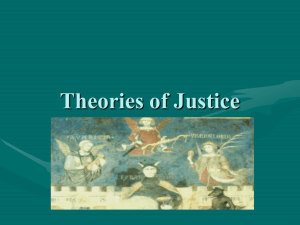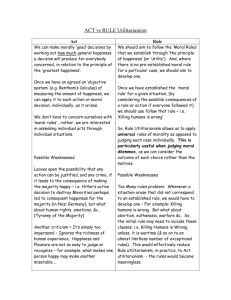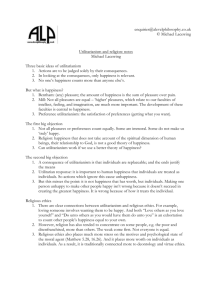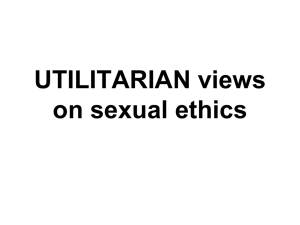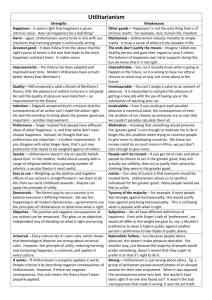The Problem of Evil
advertisement
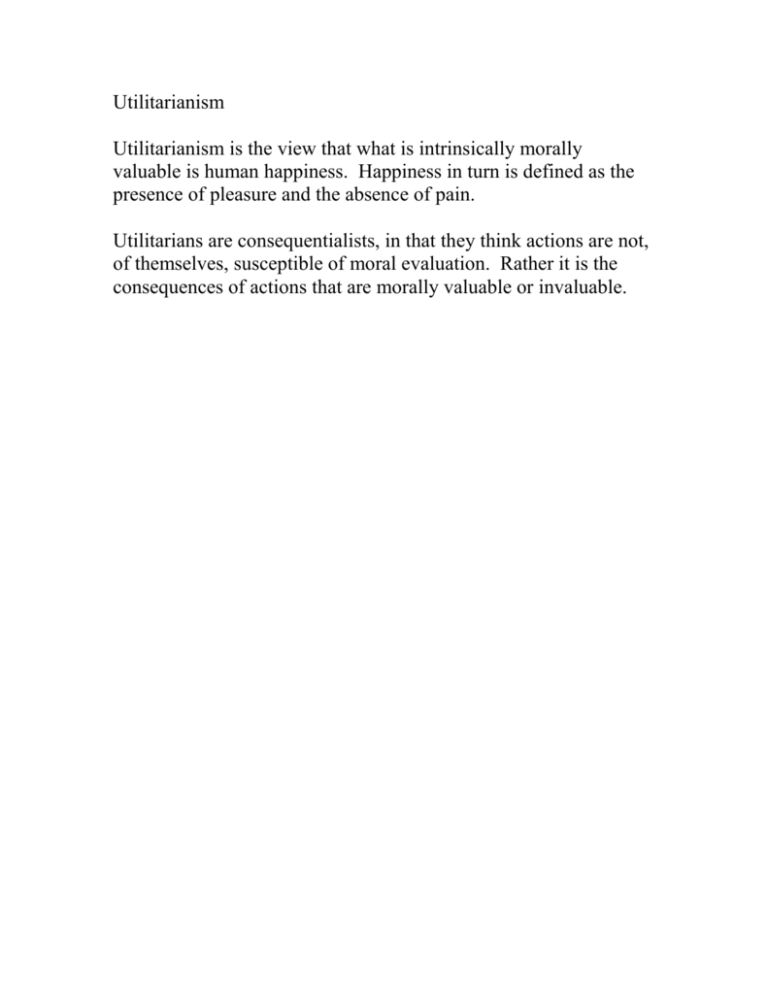
Utilitarianism Utilitarianism is the view that what is intrinsically morally valuable is human happiness. Happiness in turn is defined as the presence of pleasure and the absence of pain. Utilitarians are consequentialists, in that they think actions are not, of themselves, susceptible of moral evaluation. Rather it is the consequences of actions that are morally valuable or invaluable. There are two forms of Utilitarianism that need to be considered. One is called Act Utilitarianism, the other Rule Utilitarianism. Rule Utilitarianism says that one ought always act in accordance with that set of rule which, if generally followed, would maximize human happiness. The idea is this. Different sets of general principles would, if always or mostly followed by everyone, produce different levels of human happiness. Sets of rules which didn’t, for example, allow for private property, would generally not produce particularly happy societies; sets of rules which protect a freedom of speech generally produce happier societies than sets of rules that don’t. So a good set of rules will be one which includes private property and a freedom of speech. The set of rules which would produce the most happiness (and so which will contain both of the afformentioned rules), is the right set of rules, because that set has the consequence of producing the most human happiness. Act Utilitarianism is different. It says one ought always act to produce the most human happiness. Here it is the consequences of actions, rather than rules governing action, which determine the moral status of an action. This is not to say that one needn’t consider the long range consequences of an action; it is to say it is the consequences of that action alone which matter. So, for example, a rule utilitarian might say that a particular case of lying (my lie to my wife about her pink tuxedo) is impermissible because the best set of rules (i.e. the set that if generally followed produces the most happiness) includes a rule against lying. The reason for this is that lying in general reduces trust, and this in general does not conduce to happiness. But an act utilitarian might say that although lying in general is bad, precisely because when lying is sufficiently common, general trust is reduced, and this makes people unhappy, this particular lie will not reduce trust, but will in fact make my wife much happier than the alternative course of action (owning up that she looks silly), and hence this particular lie is ok. Mill is an act utilitarian. Mill Defends Utilitarianism from several objections. 1. Utilitarianism is a doctrine fit for swine—it enjoins people to seek a life of sensible pleasures, without regard for the higher things in life. 2. Utilitarianism is unacceptably egoistic—it enjoins people to act only in the interest of their own happiness. 3. Utilitarianism is too demanding—it requires that we act always with the motive of producing the general good of humanity, and this is too much. 4. Utilitarianism permits merely expedient actions (e.g. lies) which are not really morally permissible. 5. On cannot tell, in a given situation, which action of those available actually will maximize happiness without more and deeper consideration that time permits. Response to 1. Utilitarianism is a doctrine fit for swine—it enjoins people to seek a life of sensible pleasures, without regard for the higher things in life. Mill differentiates between kinds of pleasure, claiming that some are more valuable than others. Two pleasures, say single malt and Coors, differ from one another if in general those experienced in both prefer one to the other. Under these conditions, say, single malt is a greater pleasure than Coors. Two pleasures, say single malt and reading Shakespeare, differ in kind if, a) those experienced in both prefer one to the other, and b) would not trade any amount of the one for any amount of the other. So, reading Shakespeare is the greater pleasure, and is greater not merely in degree but in kind, because those who are experienced in both will not trade the ability to read Shakespeare for any amount of single malt. People are capable of pleasures far superior to those of mere sensuality (food, sex, drink)—no one would trade their human dignity as a person capable of the finer pleasures for the life of a swine, however replete in sensual pleasures. Hence, these pleasures are greater in kind, and therefore Utilitarianism enjoins one to seek them above all. Response to 2. Utilitarianism is unacceptably egoistic—it enjoins people to act only in the interest of their own happiness. Utilitarianism specifically enjoins one to maximize the total happiness of all humans. It is not egoistic, except that one’s own happiness contributes to the total of human happiness. In particular, if by deciding one way you make yourself unhappy, but more than compensate by making others happier than they otherwise would have been (say by charity), then one ought to act against one’s own self interest. Conversely, if acting one way will make others mildly happy, but will so damaging to your own self interest that you are made completely miserable, then you should act in your own self interest, because this action maximizes the total of human happiness. Response to 3. Utilitarianism is too demanding—it requires that we act always with the motive of producing the general good of humanity, and this is too much. Utilitarianism is in fact indifferent to the motive which drives people to act, so long as the action in fact does maximize human happiness. Further, in nearly all situations, your actions will affect the happiness of only a very few others in your immediate community—your family, friends and perhaps neighbors. In these contexts, your actions are typically driven by your attachments— one tends to care about these people. So, if you let your actions be motivated by that care, one will act in ways that maximize their happiness. Since they are all the people you really have any effect on, in maximizing their happiness you do all you can to maximize the total of human happiness. So these motives are perfectly appropriate, and commonly lead us to do exactly what we ought to do. Response to 4. Utilitarianism permits merely expedient actions (e.g. lies) which are not really morally permissible. The use of expediency here is misleading. If the consequences of a lie were limited merely to the immediate effects on the liar and the person to whom he lies, the worry might be right. But in fact the effects are not so limited. 1st, note that it is essential for a prosperous society that lying be rare—all sorts of social practices essential to civilization require that in general people tell the truth. 2nd, note that when one tells a lie, one first always ‘enfeebles’ that character trait which leads one to tell the truth as a general rule, and that, 3rd, when the lie is discovered, that inclines the person who has been deceived to be less trustful not just of you, but of everyone. It then appears that the consequences of lying are not confined to the direct effect of the lie on your own well-being and those of your hearer. Those long range, indirect and largely negative consequences outweigh the short term benefits of lying except in extreme cases. Moreover, these cases (as when lying saves a life) are widely recognized as exceptions, and Utilitarianism explains why this should be—in these cases, and these alone, the immediate benefits of a lie outweigh the long term costs, and this is especially true when the exceptions are clearly described and widely acknowledged, as they are here. Response to 5. On cannot tell, in a given situation, which action of those available actually will maximize happiness without more and deeper consideration that time permits. Mill claims that one need not calculate the consequences of one’s actions on the spot. To the contrary, prior reflection will identify various (largely commonsensical) moral rules which nearly always direct one to act in the way that in fact maximizes happiness. Rules against lying and murder, for example, are good guides to action that maximizes human happiness, one knows, or anyway ought know, this before considering a specific act of murder or mayhem. So there is no real problem in identifying the right course of action. As Mill says, any theory can be shown to “work ill if we suppose universal idiocy to be conjoined with it.” Problems may arise with respect to exceptions to the rules of thumb, and to cases in which the rules of thumb conflict—but this will be no less true of other ethical theories—moral tragedy is a feature of the human condition which no theory can avoid. Utilitarianism at least has the virtue of providing a clear account of why one rule rather than another should prevail in a given case. Other objections: In some forced choice situations, it is impossible to know what the right action is. You must either let X or Y die (e.g. you are choosing organ recipients). X is a dissolute professor type, more or less unattached, and addicted to all sorts of unsavory activities, e.g. poker and single malt. Y is a young mother of three. This seems to suggest favoring Y. But X might go on to invent a cure for aids. In this case, one should favor X. How is one to know? The moral status of your actions now depend on what others, outside of your control, do in the future. My typing the line above seems perfectly innocuous. But if, 10 years hence, someone decides to become a mass murderer just in case the first we page he pulls up contains a line with the words ‘moral status of your actions now’, and he pulls up the page for this course, I will have done something seriously wrong. But its wrongness is not under my control. It is hard to see how to make sense of the idea of rights on act Utilitarian accounts (Mill himself actually has one of the better treatments of rights from this perspective). One has a right to X if it is immoral for someone else to interfere with your use of X (negative rights), or to fail to provide you with X (positive right). We typically think that people have a negative right to life. But consider the position of the emperor of Rome. He has lots of bored, unemployed people living right at the edge of poverty. The next grain shipment from Egypt has been delayed. If he does nothing, there will be riots in the street, leaving thousands dead. Or, he can forestall the riots by providing entertainment at the circus—If he sacrifices 30 or 40 Christians to the lions, then there will be no riots. Utilitarianism suggests that the best thing to do is sacrifice the Christians, and this seems wrong. Mill suggests that he ought not because, in so doing, he weakens the social institutions which make civilized life possible—he sacrifices some who are themselves innocent for the sake of a larger number of others. But it is not so clear that he is right here. In fact, such sacrifice is always a consequence of policy—whenever a policy is chosen, some suffer (because they would have benefited from an alternative policy) in order that others do well (they benefit from the current policy). E.g., we allow power companies to generate power using unclean coal. As a result, a number of people die each year—mining coal, producing the power, and as a consequence of the pollution produced—people who would have lived had we forbidden the generation of power by coal fired plants. The beneficiaries are the stockholders and those who receive cheaper power. Whether or not this particular policy is justifiable on utilitarian grounds, we don’t see it as shaking the foundation of civilized society. The repugnant conclusion. A final objection to utilitarianism has to do with procreation. Suppose the world could support 7 billion people who are very happy, or 10 billion moderately happy people, or 20 billion people with lives that are, on balance, worth living, but only just worth living. The total happiness might be greatest in the world with 20 billion people, in which case utilitarianism enjoins us to procreate like mad. But that seems wrong. To avoid the result, some have suggested a modification—one ought always act so as to maximize the average happiness. This would seem to imply that the world with 7 billion people is better, and we ought all to limit the number of children we have. But there is another way to increase average happiness—find the billion people who are least happy, and execute them. Then the average happiness will increase. So this sort of utilitarianism seems to enjoin the summary execution of the least happy people. This is not only intuitively wrong, it is incoherent. For taken to the limit, it implies one ought to execute everyone less happy than you, and then commit suicide. Of course, if everyone did this, the world would contain one more or less unhappy person. I
